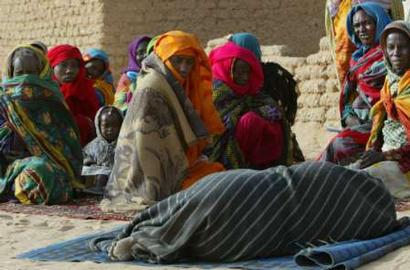Bombings show Sudan seeks no compromise-rebel

TINE, Chad/Sudan border, Jan 27 (Reuters) – For a man who had just escaped being blown up in an air raid by a Sudanese government bomber, Abu Bakr Hamid al-Nur, was in a remarkably jovial mood.
As if on cue, the raid had seemed to provide perfect backing for the rebel’s assertion that the government is intensifying its bombardment of villages in western Sudan with scant regard for civilian life.
“They want to damage and kill, this is what they are doing daily,” Al-Nur, general coordinator of the rebel Justice and Equality Movement (JEM), told Reuters by a dried out river bed marking the Chad-Sudan frontier.
“They were bombing yesterday, before yesterday and today,” he said, somewhat breathless after ducking into cover from the latest blasts in the border town of Tine on Monday.
Rebels in turbans, sandals and shouldering AK-47 rifles followed behind, exchanging grins at their luck in escaping bombs that landed just 20 metres (yards) from where they had been crouching behind rocks on the Sudanese side of town.
High in the sky, the plane flew away – like a tiny white cross against the blue – but rebels say it will soon be back.
JEM accuses the government of launching a massive offensive to wipe out their rebel group, active in Darfur and across western Sudan, with indiscriminate bombing of civilian targets designed to force the population off the land.
Observers say there is plenty of evidence to support the claim – pointing to tens of thousands of refugees, mainly women and children, who have flooded into Chad since December, many of them fleeing bombing by the government.
JEM SEEKS INTERNATIONAL HELP
Reuters witnessed the latest attack on Monday, when an Antonov dropped two payloads of bombs on Tine, turned into a ghost town by the now routine but still terrifying raids.
Government officials were not immediately available for comment on the attack.
The Sudanese armed forces sources have previously said they do not want to comment on the troubles in Darfur to minimise press coverage of the conflict.
JEM and another rebel group launched a revolt in western Darfur last February, accusing the government of neglecting the impoverished area.
Fighting has intensified in recent weeks since peace talks with one group collapsed, providing a sharp contrast to a series of deals struck by government and another rebel group aimed at ending their 20-year-old civil war in the south of the country.
JEM says the government has bombed 15 to 25 villages in the western Darfur region daily since mid-December, when peace talks with the government hosted by Chad broke down.
The rebels put the death toll from these attacks at about 2,000 civilians, although it is impossible to independently verify attacks over a vast area of desert and savannah.
A steady procession of wounded trooping into a medical tent on the Chadian side of Tine with shreds of gangrenous skin hanging from the stumps of limbs testify to the damage the bombing is inflicting on the civilian population.
Like southern rebels, western insurgents say they are fighting to end years of neglect and exploitation by the Islamist government in Khartoum, but have so far won none of the concessions southerners have done at the negotiating table.
JEM and the allied Sudan Liberation Movement/Army – the main western groups – say the government has intensified attacks to avoid pressure to make similar compromises in the west as it has done in the south.
“They want to minimise the resistance of our rebels before the international community calls for peace,” said Al-Nur, 50, his moustachioed face and chin swathed in a flowing green headscarf atop long green robes.
“The government doesn’t want to make peace in this area,” he said. “They think that they can crush our rebellion in a very few days, and that’s impossible.”
JEM says it is ready to meet the government if countries like the United States and Britain will play a similar role in supporting the talks as they have done for the peace negotiations for the south, which are hosted by Kenya.
But as long as the bombing continues, JEM says attempts at negotiations with the Khartoum government will be futile.
“What they say is different from what they do,” Al-Nur said. “We don’t trust them.”
